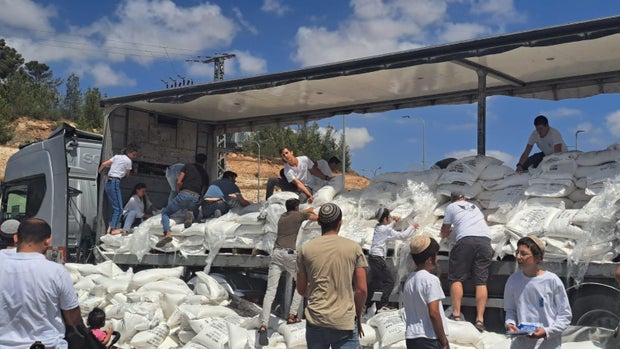Jerusalem – For months, images of Jewish settlers and right-wing extremists attacking aid convoys bound for Gaza sparked global outrage. Widely circulated on social media, photos and videos showed far-right Israeli activists preventing humanitarian aid trucks from entering the city’s intersections. war-torn Palestinian territorylooting the vans and throwing aid on the ground.
The attacks have drawn ire from the White House, with US National Security Advisor Jake Sullivan telling reporters last month that it was “absolutely outrageous that there are people who are attacking and looting these trains coming from Jordan and heading to Gaza to deliver humanitarian assistance.” .”
“We’re looking at the tools we have to respond to this,” Sullivan said. “We are also voicing our concerns at the highest level of the Israeli government and it is something we have made no bones about – this is completely and totally unacceptable behavior.”
It wasn’t just aid that was attacked. There was also physical violence.
In the video shared with CBS News, Palestinian truck driver Mohsen Shaheen can be seen lying on the ground, bloodied, next to his vehicle. He says he was beaten by a group of settlers who wrongly assumed he was transporting aid to Gaza.
“The window of my truck was open and a settler came and pepper sprayed me,” Shaheen told CBS News. “Then there was a rock or iron bar breaking the other window. It hit me in the face. There was blood everywhere… I thought I was going to die.”
Shaheen said the Israeli soldiers present did little to help him.
Last month, Sapir Sluzker Amran, an Israeli peace activist who witnessed an attack by right-wing activists on a humanitarian aid truck in the occupied West Bank, told CBS News a similar story.
Amran said a member of the far-right group slapped her as she tried to stop the attack on aid trucks and that Israel Defense Forces personnel present at the scene refused to help her.
Amran also said that right-wing extremists were often informed about humanitarian aid convoys by the Israeli military and police.
“They know, so they have advance information about when the trucks arrive, and they post it on social media and post it in their groups, WhatsApp groups, and ask people to come together and block or damage the aid,” she said.
Av. Sapir Sluzker Amran, co-director of the Breaking Walls movement
CBS News gained access to a WhatsApp group used by one of these groups called “we will not forget.”
It cataloged in detail how many trucks would be in a convoy, which routes they would travel and the crossings they would pass through on a given day.
In a message, a chat member appeared explaining where the information came from. “Methods for blockade acts: we have obtained preliminary information from workers, police and soldiers crossing the border,” the WhatsApp message said.
CBS News reached out to Israeli security forces for comment on allegations that some members alerted far-right groups who blocked aid or failed to intervene when convoys were attacked. The Israeli military referred CBS News to Israeli law enforcement authorities, who said in a statement that, “to the best of their knowledge,” the allegations were “baseless” and “unsubstantiated rumors.”
Another message referenced Bezalel Smotrich, Israel’s ultranationalist Finance Minister.
“For those asking, the following information came from Minister Smotrich, who wrote to the Prime Minister and asked him how he approved aid to Gaza,” the text said.
GIL COHEN-MAGEN/AFP/Getty
Smotrich, an influential figure in Prime Minister Benjamin Netanyahu’s cabinet, used his position to block a US-funded shipment of flour to Gaza in February, after making an unsubstantiated claim that the flour, which was being transferred to the United Nations, would go to Hamas. .
CBS News requested comment from Smotrich on allegations that he helped extremist groups. The issue was met with a firm denial from the Finance Minister’s office.
Withholding humanitarian aid from Gaza is not an entirely fringe vision in Israel. A March poll by Shiluv I2R, a leading Israeli survey and research company, revealed that 44% of Israelis believe the country “should condition aid on a hostage release agreement.”
22% said no aid should be provided until the war was over.
Yosef de Bresser is among those who do not want aid to reach Gaza. One of the main organizers of the blockade movement, he told CBS News that he has been detained 12 times for obstructing supplies to Gaza, but, until now, he has not yet been charged.
“In every war there is someone who loses and someone who wins,” he said when asked why he thought it was right to block humanitarian assistance to Gazans. “Either the people of Gaza will die, or the people of Israel will die… It’s black and white.”
After nearly nine months of devastating violence and destruction, aid agencies say the amount of aid reaching desperate Palestinians in Gaza is still woefully insufficient.
While attempts by settlers and activist groups to block these supplies have only had a limited impact, aid agencies say the real obstruction comes from the Israeli government.
Multiple agencies assert that Israel routinely and arbitrarily prevents legitimate humanitarian goods from entering Gaza through a highly complicated inspection and approval process and without clear or consistent instructions.
The UN says that 1.1 million people – almost half of Gaza’s population – now face catastrophic levels of hunger and that the territory is on the brink of famine.
Shaheen Mohsen says he has been unable to work since he was attacked and does not believe he will receive justice.
“I don’t expect justice. The whole world sees that there is no justice,” he said.
bol co
jogo de terror online
novela sbt ao vivo
wishlist
musica terra seca
taça png

























